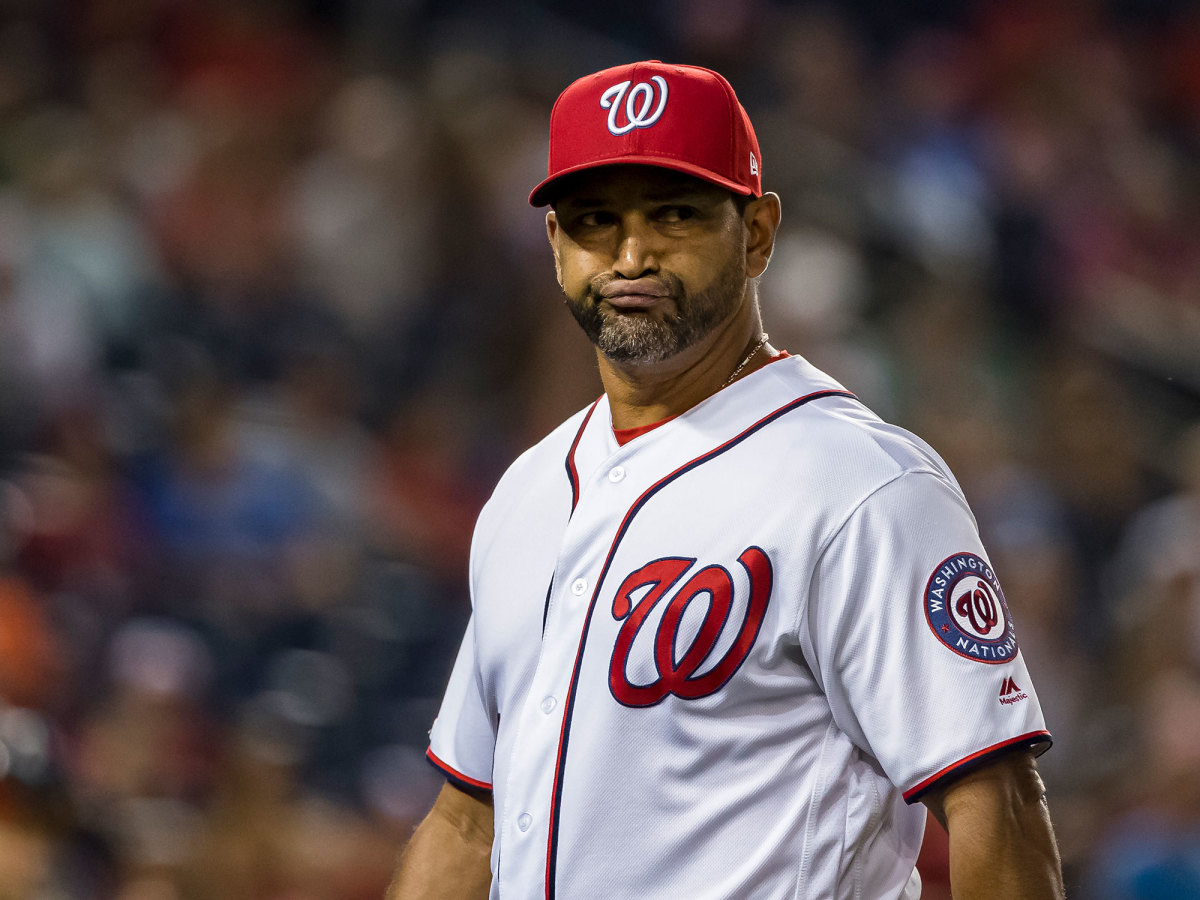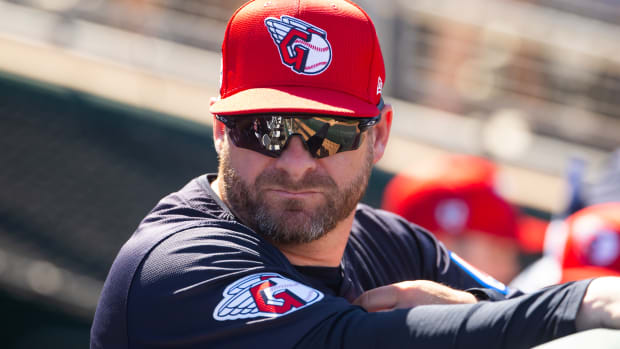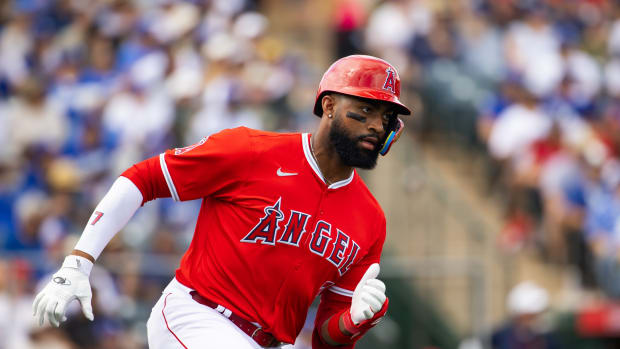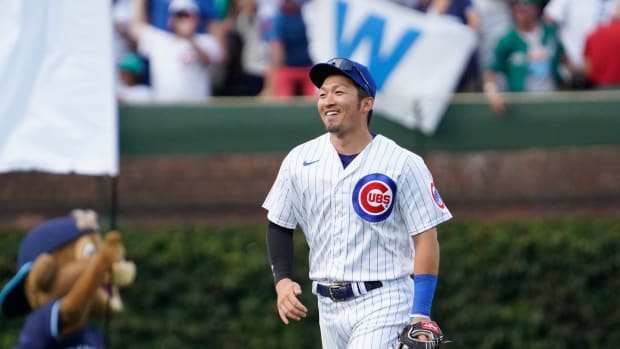Will Dave Martinez Be the Manager to Finally Push the Nationals Forward in October?
Washington, D.C. — If you want to know how the Washington Nationals became the ninth postseason team ever to rally from 12 games under .500, or how they somehow overcame the worst bullpen of all 450 teams that ever made the postseason, you have to understand the steady hand of their manager, Davey Martinez. And if you want to know how Martinez steered this team through early storms into the postseason port, you have to know how he handled a hidden predicament Sept. 6.
Washington lost that night in Atlanta, 4-3, to the first-place Braves. It was its third straight loss. Martinez noticed something that night that irked him. He simmered silently until after the game. Then he sat down at the desk in his office and pulled up the video of the game, toggling until he reached the top of the fourth inning. Then he pulled out a stopwatch.
Leading off against Dallas Keuchel, Juan Soto, the Nationals’ superb 20-year-old leftfielder, hit a weak groundball to second base. Martinez started the stopwatch. By the time a jogging Soto touched the base, about 6.1 seconds had elapsed.
The next batter was Ryan Zimmerman, Washington’s 35-year-old first baseman who missed most of this season with a foot injury. Zimmerman also hit a weak groundball to second base. He sprinted madly to first in 4.1 seconds.
Then Martinez called Soto and Zimmerman into his office together. He played the videos of each of their groundballs–the young Soto in a slow jog and the veteran Zimmerman busting it down the line. He told them their times to first base.
Soto got the message. He apologized to Martinez. And then he did something even more interesting: he apologized to Zimmerman, the longest-tenured player on the team.
Washington lost the next night, but finished 15-6, including a season-best, season-ending eight-game winning streak. But its comeback was much longer in the making. After starting 19-31, the Nationals went 74-38, equaling the Dodgers for the best record in the league in that span. On the hot seat in May, Martinez will manage his first postseason game Tuesday when Washington hosts Milwaukee in the NL wild-card game.
Baseball is in a fascinating place when it comes to the role of the manager. Counterintuitively, while the subtleties of this boom-or-bust game continue to get sanded away–fewer singles, fewer stolen bases, fewer hit-and-runs, fewer bunts, fewer balls in play–the manager has become more important. That’s because games, seasons and jobs tilt heavily on the manager’s two greatest responsibilities these days: running a bullpen and “connecting” with players, especially the young ones.
Front offices have reacted to these shifts in the game by devaluing experience and emphasizing “connectivity” when it comes to choosing a manager.
Today veterans Joe Maddon, 65, Ned Yost, 65, Bruce Bochy, 63, and Clint Hurdle, 62, are all gone, whether by their choice or not. Already the majority of managers this season–18–were on their first big-league managing job. Eleven of those hired without any experience, including Martinez, were hired in the past two years. Five of those 11 already have guided their team to the postseason (Martinez, Mike Schildt, Aaron Boone, Alex Cora, and Rocco Baldelli).
Incredibly, eight of the 10 managers in this postseason are on their first big-league managing job, all hired within the last five years. The only managers in this postseason on their second or third job are A.J. Hinch of the Astros and Bob Melvin of the Athletics.
Craig Counsell, 49, of the Brewers is the longest tenured manager in the National League. Here’s what that means: the entire league flipped its managers within a five-year window.
From 2006-17, none of the 12 managers who won the World Series did so on their first job. Then Alex Cora did so last year with Boston, and now we have an eight-in-10 chance that another first-time hire will do it again.
Martinez, 55, is part of this new generation of managers. Last year, hired to replace Dusty Baker, Martinez seemed overly optimistic and sometimes overwhelmed as Washington missed the postseason. This year, his optimism proved to be a strength when the Nationals stumbled through their first 50 games.
He is a stronger communicator than he is a game manager, which suits the template of the modern manager. On Sept. 18, for instance, he let his pitcher, Max Scherzer, take an at-bat with one on and one out in the seventh inning with the Nationals losing, 2-0. Scherzer had not pitched more than six innings since coming off the Injured List.
Down to his last eight outs, Martinez conceded one of them with a man on base by letting his pitcher hit. Scherzer didn’t make it through his next inning on the mound. He gave up three more runs and Washington lost, 5-1. But Martinez did engender trust from Scherzer by sticking with him–the guy to whom he gives the ball Tuesday with the season on the line.
The most amazing part of Martinez’s season is that he survived a bullpen with a 5.68 ERA, the worst of any postseason team ever. It lost 33 games. No bullpen for a postseason team ever lost more.
The Washington bullpen was putrid even though it pitched fewer innings than any such unit in baseball. Still, Martinez doled out the work aggressively. Wander Suero pitched three days in a row four times. (No Yankee reliever did so once this season). Tanner Rainey pitched in eight games in an 11-game stretch in September. Washington relievers made more appearances on no days of rest than any team in the league.
Nothing kills a manager’s security like a bad bullpen. Washington’s unit did cost pitching coach Derek Lilliquist his job. He was replaced May 2 by Paul Menhart, the club’s minor league pitching coordinator. That Martinez could ride out Washington’s deep bullpen issues and still bring this team to the playoffs is a reflection of his cool nature.
Martinez played for 15 managers over 16 major league seasons, so he was exposed to various temperaments and philosophies, from Frank Lucchesi, who was born in 1926, to Terry Bevington, who was born in 1956.
One of his managers once mistakenly made a second trip to the mound in an inning when he had no one warming in the bullpen. Martinez, who joined the mound visit from first base, came up with a quick, brilliant idea to solve this emergency: summon one of the relievers who was scheduled for a night off, order him to intentionally walk one batter, then replace him with a reliever who during that time could warm up properly. Martinez’s idea worked perfectly.
Tuesday night the consequences of Martinez’s ideas will be far greater. Since moving to Washington, the Nationals reached the playoffs four previous times and never advanced. This is the fourth time they will play a winner-take-all postseason game in Washington. They held the lead in each of the previous three–twice with Scherzer on the mound at home–and lost all three.





































